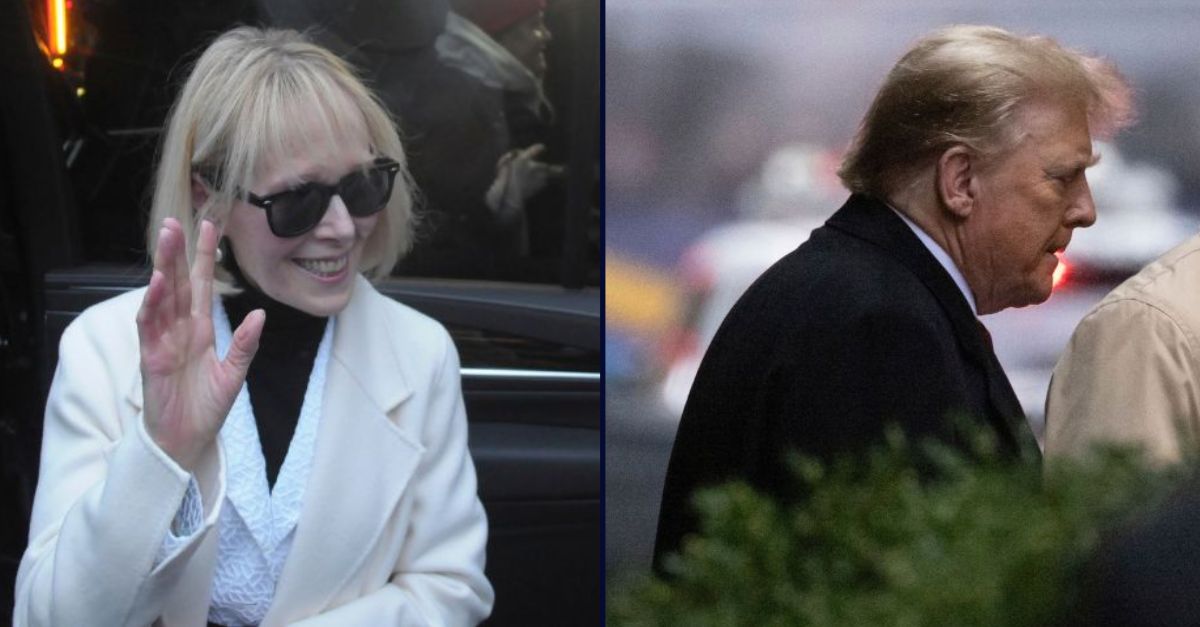
Left: E. Jean Carroll enters a vehicle outside of Manhattan federal court following the verdict in her second defamation trial against Donald Trump. (Jimin Kim / SOPA Images/Sipa USA via AP Images). Right: President Donald Trump leaves his apartment building, Friday, Jan 26, 2024, in New York (AP Photo/Yuki Iwamura).
A federal appellate court finally made good on a promise to explain why it handed President Donald Trump a huge loss in the long-running defamation case brought — and won — by writer E. Jean Carroll.
In late June, the U.S. Court of Appeals for the 2nd Circuit tersely rebuked an effort to have the public pay for Trump”s appeal of the $83 million judgment in Carroll’s favor. The three-judge panel rejected a claim under the Westfall Act of 1988, a law that can force the U.S. Department of Justice to step into the shoes of government officials sued for torts committed within the scope of their official duties.
“The Court will issue an opinion detailing its reasoning in due course,” Senior U.S. Circuit Judge Denny Chin, a Barack Obama appointee, along with U.S. Circuit Judges Sarah Merriam and Maria Araújo Kahn, both Joe Biden appointees, promised on June 18.
Now, nearly two months later, the panel explained its reasoning in a 23-page per curiam opinion. The nix here is mostly a matter of time.
To hear the court tell it, the Westfall Act itself “statutorily” bars the claims because they were filed after trial, Trump and the government “both waived their rights” by filing for such relief at the wrong time, and “in any event, principles of equity warrant denying the belated motion” and affirming Carroll’s victory against Trump himself.
Love true crime? Sign up for our newsletter, The Law&Crime Docket, to get the latest real-life crime stories delivered right to your inbox.
The Friday decision begins with a helpful summary before launching into the text of the statute, finding “three avenues for substitution.” One is for actions initiated in federal court along with a certification from the U.S. attorney general, the second is for actions removed from state to federal court, and with the aforementioned certification, the third is for actions lacking such a certification.
Here, Carroll’s case began in New York state court in November 2019 and was removed to federal court by then-Attorney General Bill Barr in September 2020, along with the Westfall Act certification.
Carroll won the merits of her case at the summary judgment stage. A jury trial was then held in January 2024 to determine damages.
The court found the niceties of civil procedure – and years’ worth of intervening events – weighed against the 45th and 47th president.
First, the court determined, Barr’s certification alone was not enough.
“Certification is conclusive for purposes of the removal to federal court, but the question of substitution is subject to judicial review,” the opinion reads. “Upon such review, the District Court denied the motion to substitute.”
Trump, of course, appealed that ruling – and might have been substantially heartened when a previous panel on the 2nd Circuit reversed and remanded the case back to U.S. District Judge Lewis Kaplan. But this ruling essentially just punted the issues and reshuffled the decks.
To be sure, the ruling certified a question to the D.C. Circuit about whether Trump was acting in the scope of his employment – as president – when he defamed Carroll. But instead of answering that question directly, the D.C. Circuit simply provided the federal district court’s law about the scope of employer-agent liability in general terms. Then, the 2nd Circuit sent the law back down to Kaplan and told him to fashion his ruling with those legal principles in mind.
With the case back before Kaplan – and with Merrick Garland in charge of the DOJ – the federal government revoked the Westfall Act certification in July 2023. Kaplan credited that revocation.
“No further action was taken in the District Court by Trump or the government regarding Westfall Act substitution,” the panel notes.
So, the appeals court determined, the requested substitution did not occur before trial. But, the panel stresses, this is not a conclusion reached through procedural whack-a-mole due to unassailable odds. Rather, the court says, Trump had options – and did not use them.
More Law&Crime coverage: ‘Oral argument will proceed as scheduled’: Appeals court rejects Trump bid to delay his own appeal in E. Jean Carroll defamation case, handing him second loss in one week
Here, the panel’s first and second reasons for rejecting the claim – filing too late and later waiving an avenue of substitution – effectively interlock, if they do not entirely blur together.
From the opinion, at length [emphasis in original]
Trump could have sought substitution after the government declined to issue a pre-trial certification in July 2023 by petitioning the District Court under [the section outlining how to request substitution lacking a certification]. That provision provides that if “the Attorney General has refused to certify scope of office or employment under this section, the employee may at any time before trial petition the court to find and certify that the employee was acting within the scope of his office or employment.”
But Trump – the “employee” under this language – waived his right to petition for certification under that subsection.
“Indeed, at no time after the remand did Trump file anything regarding substitution in the District Court,” the opinion goes on. “By declining to seek such relief, Trump waived his right to now bring this motion.”
And Trump’s latest motion, the court observed, was filed far too late.
“This motion was filed after trial, and before this Court, during the pendency of Trump’s appeal,” the panel wryly explains.
Offering a tertiary reason to reject Trump’s request, the panel lands on the idea of fairness for Carroll and all she has been through.
“The parties have litigated this case extensively for more than five years, through multiple courts,” the opinion continues. “The practical impact of permitting the Movants’ untimely motion to substitute would be to unwind those five years of litigation and a duly-rendered jury verdict, and, potentially, to deprive Carroll of any opportunity to pursue her claims.”
The judges point out how Trump and the government waited for “nearly three months” to file the latest request, at which point the appeal had been fully briefed for “nearly two months.”
“After several years of litigation, at substantial cost to all parties, and a significant victory for Carroll, it is simply too late to bring this motion,” the panel concluded. “Fairness and equity dictate that the motion to substitute be denied.”








